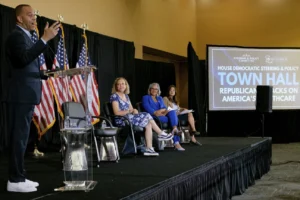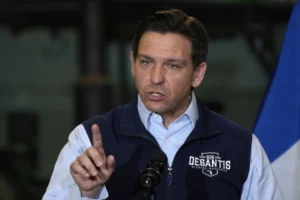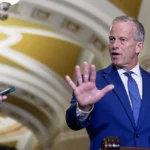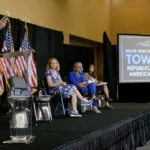Wyoming Supreme Court Appears Unlikely to Allow GOP Intervenors in Abortion Case
The justices had tough questions for both sides, will rule in coming days
- Published In: Politics
- Last Updated: Dec 13, 2023
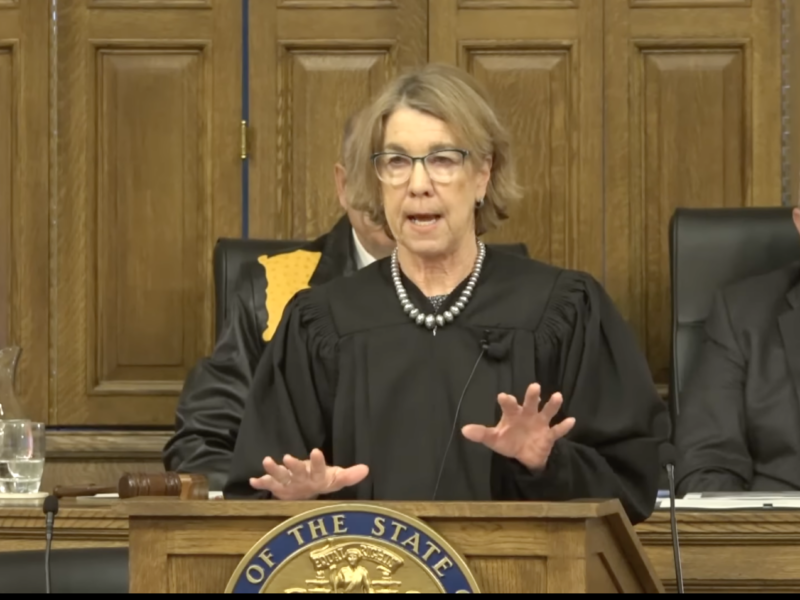
Chief Justice of the Wyoming Supreme Court Kate Fox, seen here during the 2023 State of the Judiciary address, participated in a hearing concerning abortion matters on Tuesday. (Photo via YouTube / WyomingPBS)
By Jacob Gardenswartz
Special to the Wyoming Truth
The Wyoming Supreme Court appeared unlikely to reverse a lower court decision and allow a collection of anti-abortion lawmakers and an advocacy group to intervene in the ongoing lawsuit against the state’s abortion bans. The justices said their final decision on the matter would be rendered soon.
During an hour-long hearing on Tuesday, attorneys for Reps. Rachel Rodriguez-Williams (R-Cody), Chip Neiman (R-Hulett) and the anti-abortion advocacy group Wyoming Right to Life — who were all involved in developing the abortion bans — argued passionately for the officials’ right to participate in the lawsuit. Tim Garrison, senior counsel with the conservative Christian legal group Alliance Defending Freedom, suggested his clients were “uniquely qualified under multiple decades of advocacy” to defend the abortion bans in court, at times going so far as to criticize state leaders’ ongoing efforts to defend the bans and suggesting his clients would pursue a different approach.
But allowing individual lawmakers to intervene in the litigation would be “unprecedented,” countered Peter Modlin, an attorney representing the group of Wyoming women, doctors and an abortion fund seeking to have the bans struck down.
Regardless of the outcome of the lawsuits, Modlin argued, “the legislators may continue to legislate, the Right to Life Wyoming may continue to advocate and all of them may continue to support pro-life groups just as they did before.”
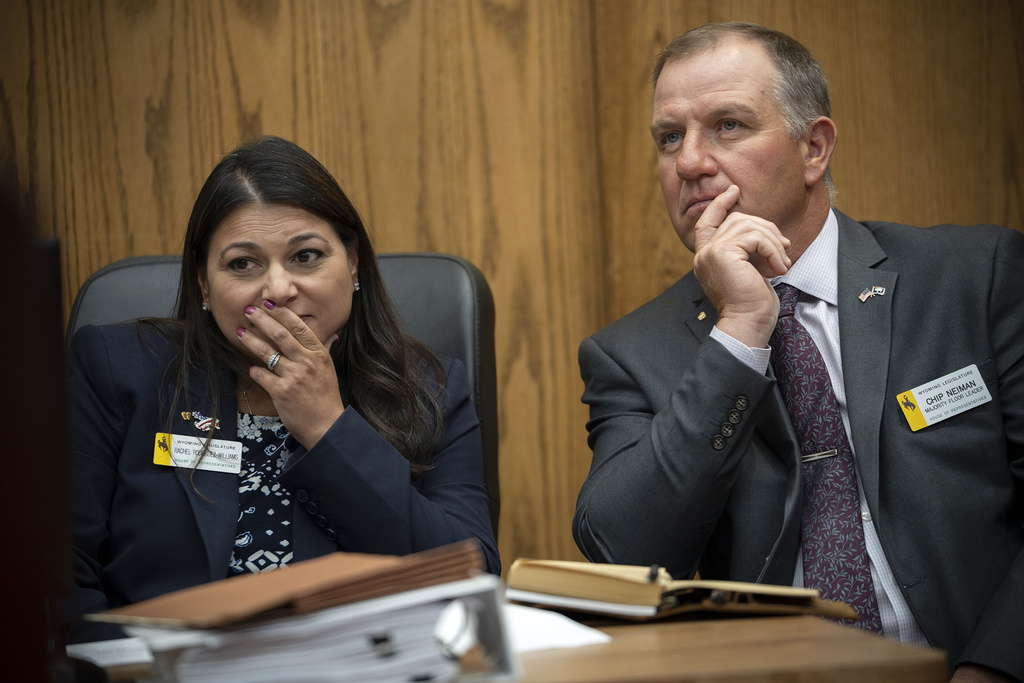
Modlin also suggested the timing of such an intervention would significantly impact the legal challenge to the bans now pending before a Jackson district court. A major hearing in that matter is scheduled for Thursday afternoon.
“If intervention is granted at this point, for the proposed intervenors to have a meaningful opportunity to intervene we now have to wind the cloud backwards and restart this case from the beginning,” Modlin said, arguing it would impose an “undue burden” on all parties involved.
Though the justices declined to rule from the bench, their questioning indicated they were leaning towards upholding the decision to block the lawmakers’ participation.
Commenting on a number of cases cited by the lawmakers’ attorneys as precedent for why they should be allowed to participate in the case, one justice noted those cases all concerned environmental issues, where intervenors have historically been given far more leeway to participate. “There’s really a divergence in how cases look at environmental issues and other issues,” the justice noted.
Later, another justice was more direct in her criticism of the proposed intervenors’ claims: “It seems to me that your argument to support your motion to intervene is premature,” she said, suggesting the lawmakers could support efforts to appeal the abortion ban case once the district court renders a final decision.
Arguments pit GOP lawmakers against GOP state officials
As the anti-abortion lawmakers and advocacy group made their case to join the suit, their arguments increasingly pitted them against the state leaders currently defending the abortion bans in court.
During Tuesday’s hearing, Special Assistant Attorney General Jay Jerde, who has handled the majority of the defenses’ arguments thus far, trod a thin line. He took no position as to whether the lawmakers should be allowed to join the case, but pushed back against the suggestion he’d failed to present a fulsome defense of the bans.
“The state was not opposing intervention, but to the extent that the appellants are saying that state’s not adequately defending the constitutionality of the statutes, we would categorically reject that,” Jerde said. “The state is defending this case as vigorously as it can possibly be defended.”
Their dispute largely hinges on Jerde’s legal tactics. The plaintiffs have argued that the case concerns questions of fact: if abortion counts as health care, if exceptions written into the laws are too vague, if the laws promote one religion over another and more. They’ve put forward a list of eight experts to help the court make such determinations.
Jerde, meanwhile, has argued the case should be decided solely based on questions of law — namely whether the bans, as written, are constitutional. As such, he’s sought to prevent expert testimony in the case, though Teton County District Court Judge Melissa Owens rejected that request late last week.
The proposed intervenors say Jerde is doing the bans a disservice by not pushing to introduce experts of his own. Without weighing in on whether Jerde is correct that the case solely concerns legal questions, Garrison suggested the plaintiffs’ “assertions have not been rebutted,” arguing his clients are “uniquely positioned by virtue of their advocacy for these types of protections for many years to refute those [claims].”
Modlin noted that because Jerde and the lawmakers are on the same side, there’s no need for the lawmakers to be allowed to participate: “The proposed intervenors and the Attorney General have exactly the same objective, and therefore there is a presumption of adequacy.”
He also argued that a disagreement over how to pursue a defense shouldn’t be enough to allow the parties’ intervention. “What we have here is a difference of opinion on how to litigate the case, a difference of opinion on the litigation tactics, which courts agree is not a basis for finding inadequate representation,” Modlin said.
A political ‘slippery slope’
The plaintiffs opposing the lawmakers’ intervention closed by arguing that allowing them to participate could politicize the proceedings, something Owens herself warned of when she denied their initial request to join the case.
“There is a slippery slope issue here,” Modlin argued. “If you begin to allow individual legislators to intervene in cases challenging statutes, then you’re very quickly going to see those who voted for a statute intervening on one side, legislators who voted against it intervene on the other side, and we’re going to get a reprise of the political debate in court which is not appropriate.”
Garrison countered that the proposed intervenors aren’t seeking to participate as lawmakers but instead as anti-abortion advocates. “We’re not really putting them forward as legislators,” he said. “They are longtime activists in this area… [and] have an interest in preserving the fruits of their efforts here.”
Responding to Modlin’s arguments directly, Garrison promised: “We are not asking the court to open the floodgates of litigants by this action.”
The justices provided no timeline for when they might rule, though a decision is expected soon. In the meantime, abortion remains legal in Wyoming up to the point of viability.




